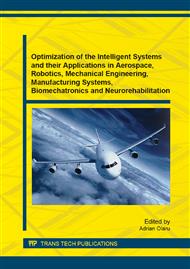p.431
p.437
p.443
p.449
p.455
p.465
p.471
p.485
p.491
Contribution to Mathematical Modelling of Oil Field Data
Abstract:
The paper deals with application of selected suitable analytical methods use to analyse field data from medium off-road military vehicles. Some pieces of information from oil are interpreted thank to diagnostics in form of polluting particles. Such particles represent processes in the engine like wear (e.g. Fe, Cu, Pb, etc.) and oil condition (like e.g. Mn, Si, Zn, etc.). These particles can give us information both about system state and about oil state. Thank to good recording system we have data from field operation available. Therefore we decided to use selected analytical – algebraic methods for determining the specific particles generating trend. Based on the outcomes we hope to be able to determine the system condition (e.g. residual operation life, maintenance modifications in the intervals, etc.). Selected methods like regression analysis, base functions and fuzzy inference system will be used for the data assessment. The results itself might be beneficial in other forthcoming analysis like quality, risk and dependability management processes, e.g. for optimization during an operation and maintenance phase, logistics and spare parts planning, life cycle costing, mission planning, etc.
Info:
Periodical:
Pages:
455-462
DOI:
Citation:
Online since:
July 2013
Authors:
Price:
Сopyright:
© 2013 Trans Tech Publications Ltd. All Rights Reserved
Share:
Citation:


